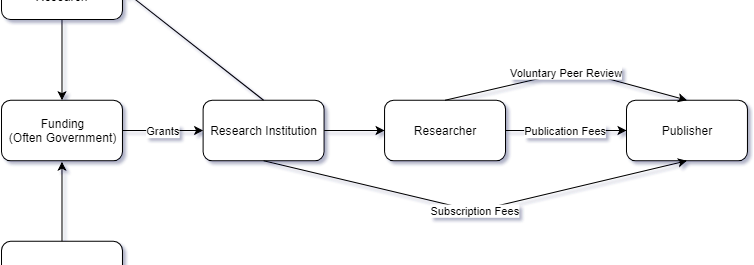Starting with ArXiv, the idea of preprints has been increasingly in popularity for some time. But now is the time for omniprints. Preprints were a good start. And Crossref has been indexing more and more preprints, with preprints outpacing journal articles by far (Crossref). There are a number of servers, including ArXiv and its derivatives, OSF’s preprint servers, ResearchGate, and more.
I rely exclusively on preprint servers for my publication, mostly out of spite for modern academia and its toxic nature. I absolutely refuse to pay a company so that they can profit off of my work. And honestly, if the goal of publishing is to communicate with other researchers, than traditional publications are not the answer, especially when they’re not open access.
But there’s an issue. A lot of people reject citation of preprints. They want to wait until there’s a “final” version. It’s not even that they’ll scrutinize it more heavily, but rather they will outright use the preprint nature of the paper to ignore it.
Of course, what matters isn’t whether a journal has decided to pick up an article — Wakefield taught us that—but rather what matters is that the content of the article is sound. And in order to determine whether that’s the case, a person has to read the article.
I do think that part of the problem is that the articles are called pre-prints. It’s right in the name: the article hasn’t been printed yet. It hasn’t been completed. That’s why we need to rename preprint servers, which have long since become far more than that, to something else. I’m not really sure what name we’ll end up using, but perhaps “omniprint” is the best option, as it implies “all prints” whether preprint or postprint, draft print, or final print.
Real Open Science
Related to omniprints is the idea of open access, where a journal lets anyone access the publication. I don’t see open access as real open science. It’s certainly a start. After all, if the goal of publishing is to communicate, we need to be able to read what’s being published! But it’s simply not enough. For one thing, publishing in open access journals is often very expensive, literally costing the author thousands of dollars! That’s why we need omniprint.
Actual Peer Review
Of course, in order to take full advantage of omniprint servers, they need to provide a number of tools to allow for an open peer review. Comment systems are useful, but they’re not a great way to quickly measure the quality of the paper. I think a tagging system might be useful, where people can anonymously tag a paper. Tags would probably have to include whether or not the paper is scholarly, if it justifies its position, if it needs improvement, and so on.
And that would be actual peer review. What we think of as peer review is really just one or two reviewers, who might be quite biased, along with an editor. How can we trust two or three people to make a decision about a paper, in an unbiased way? We can’t. That’s why we need omniprint.



